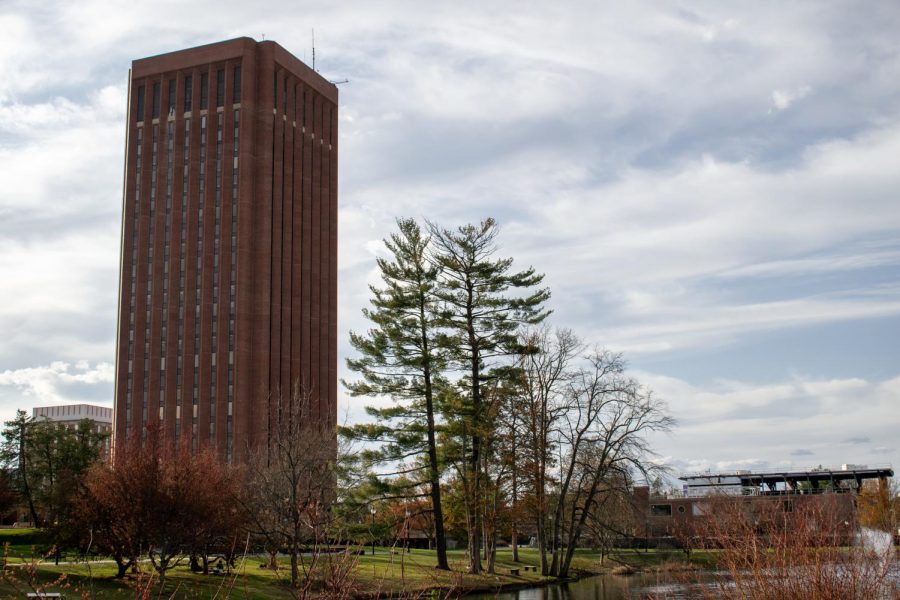The University of Massachusetts announced its plan to allow first-year students, entering transfer students and students with mandatory in-person classes to live on campus for the Spring 2021 semester on Friday. Since the announcement, students have been sharing their opinions about what this will mean for the UMass community.
Some believe that it could lead to a potential outbreak on campus which could further deter from UMass’ willingness to hold in-person classes and events, like graduation. For others, the announcement is their first chance to have something which resembles a traditional college experience.
Claire Gagnon, a sophomore history and secondary education major, was prepared for this decision. “I’m not surprised, honestly. I’m not surprised that I was cut out of the decision,” she said, referring to the fact that she was not offered on-campus housing under the new plan, “but I know it’s not the school’s fault.”
Gagnon would have liked to return to campus, but because her majors are more easily adaptable to online classes than many other majors the University offers, she was expecting to remain at home next semester. “While it sucks that I’m getting my degree in history and secondary education in my childhood bedroom, I had a feeling that if UMass was going to let more of us back on campus, I wouldn’t be part of it.”
Unlike Gagnon, Ben Katzman, a sophomore economics major, was surprised by the University’s decision. “I’m very concerned by the idea of freshmen being on campus,” said Katzman. “They will do all the normal freshmen activities, which will spread corona more than any other age group, potentially.”
JJ DiPietro, a senior mechanical and industrial engineering major, shared a similar concern. “That is a really disconcerting choice to make for a university community,” said DiPietro. “There have been parties on campus this semester creating viral transmission clusters.”
In late September, the University reported a cluster of 28 positive cases, which they believe to have stemmed from a single party.
DiPietro feels that the University should be taking more initiative to keep the campus community safe. “The administration should be protecting us rather than leaving the decision to essentially brand new adults who may not prioritize their health,” she said.
Gagnon is not only concerned by the potential gatherings that could result from an influx of students living on campus, but also by the way that students are currently behaving and how the University is responding.
“These off-campus students are treating COVID like it’s no big deal. UMass made statements on how upset they were, seeing how many off campus parties had resumed when students began their leases, but made no effort to punish them,” said Gagnon.
On Oct. 7, UMass announced that nearly 200 students have gone through the campus conduct process.
Gagnon added, “I had a friend [who] had a party and named it ‘The 100 Party’ when [cumulative] cases reached over 100 on campus. No one was disciplined.”
Some students however, like sophomore biology major Jess Santiago, are more optimistic about the upcoming semester.
“I definitely have my concerns about COVID with the new students in the spring, but I also have hope that everyone who goes back will do their part to keep the spread of [the virus] to a minimum,” said Santiago.
Santiago plans to closely adhere to the University’s protocols if she returns to campus. “I personally will do everything I can to follow the guidelines and I think that a majority of people returning to campus will as well,” she said. “I definitely think there are always people who will want to break the rules, but I also think that a lot of people going back are grateful to be there and will follow the guidelines in order to stay on campus.”
Shreyans Bachhawat, a junior finance major and international student, wishes that the University would have focused on having students returning to the classroom, rather than returning to the dorms. “Being an international student, I have to pay more than three times than what an in-state student would pay,” he said. “I think it’s fair to ask UMass to prioritize shifting to an in-person mode of instruction rather than repopulate the dorms.”
Bachhawat plans on returning to Amherst and living off campus in the spring semester. While he is concerned about the virus, he believes that the UMass community will be able to keep it contained. “I know that if everyone just plays their part and can control their temptations to party for another semester, we should be fine.”
Like Santiago, Bachhawat believes that the majority of students will stay compliant with the University’s social distancing restrictions in order to stay on campus. “I think most of the students will follow the guidelines, we all want to see UMass how we remember it,” he said. “Of course, there will always be a certain number of people who don’t follow the guidelines, but that’s inevitable.”
Sophia Gardner can be reached at [email protected]. Follow her on Twitter @sophieegardnerr.





















Lori Sadler • Nov 2, 2020 at 11:31 am
Regarding these statements, “They will do all the normal freshmen activities, which will spread corona more than any other age group, potentially.” and “There have been parties on campus this semester creating viral transmission clusters.”
I am not sure what is meant by “all the normal freshmen activities”. If you are referring to campus-sponsored events such as the activities fair, or RSO-sponsored events, almost none of them are happening or will be happening in-person during the spring.
With regard to the statement that says there have been viral transmission clusters created by on-campus parties, if you review the data on the UMass Amherst COVID Dashboard at https://www.umass.edu/coronavirus/confirmed-cases-covid-19-umass-amherst, you will see that there have been only four positive cases to date among ON-campus residents, and 158 positive cases among OFF-campus students via OFF-campus parties. None of the viral transmission clusters have been created on campus.